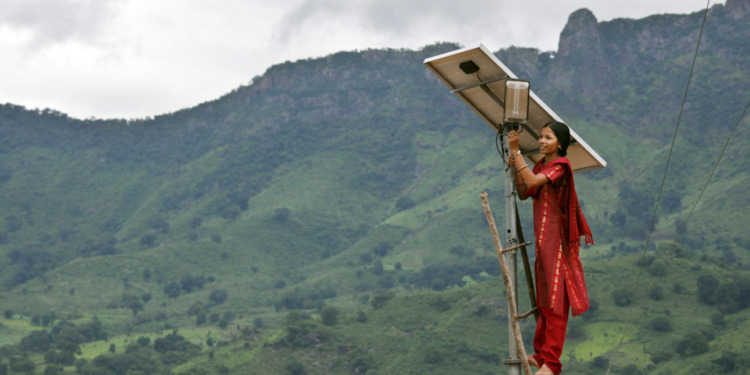In anticipation of the G7 meeting scheduled to start this week, the Global South-led initiative Debt for Climate calls on countries of the Global North to cancel developing nations’ international debts, highlighting the exploitative and historically colonial setup of the International Monetary Fund (IMF) and World Bank, and the much greater climate debt owed by rich nations to countries on the frontline of the climate crisis.
Between 82% and 92% of the costs of climate change and over 98% of the associated deaths are borne by countries of the Global South. Conversely, the Global North is responsible for 92% of the excess global carbon emissions at the root of global warming.
In 2020 alone, countries of the Global South spent a total of $372 billion servicing debt – a bleed fuelled by the convergence of climate disasters and a global pandemic, which push them into further debt. The next year, in 2021, 34 of the world’s poorest countries spent over five times more on debt payments than on protecting their people from climate impacts.
Now, with conflict in Europe sparking unprecedented energy and food crises across the globe, the relevance of debt to the climate emergency is stronger than ever.
The movement’s first press conference on Monday gathered activists from all around the world whose work is dedicated to bridging the gap between environmental and social justice, which they contend are two sides of the same coin.

“We are an emerging movement which connects social justice with climate justice,” said Argentinian activist Esteban Servat. “This campaign starts to build a bridge between working-class movements and climate movements at a time when the climate movements in the Global North are demoralised,” Servat explained, in the wake of the global pandemic, the war in Ukraine, the energy crisis, and rising living costs – all of which tend to separate climate and working-class struggles.
“Debt is a big burden on the neck of the Global South,” he said, “and through debt-trap diplomacy, the Global North is enforcing economic colonialism which also helps the expansion of fossil fuel industries.”
“The Global South has trillions of dollars worth of fossil fuels in the ground waiting to be extracted. If the debt is cancelled, enabling the Global South to keep these fossil fuels in the ground, it would be the biggest climate victory of date.”
The idea of swapping a country’s foreign debt for climate action is not new. In 1987, the environmental NGO Conservation International arranged the world’s first debt-for-climate exchange, getting $650,000 off of Bolivia’s foreign debt. In return, the Bolivian government agreed to reserve 3.7 million acres of land adjacent to the Amazon for conservation purposes.
In 2004, Jamaica entered into a debt-for-climate agreement with the US government and the Nature Conservancy, providing $16 million over a period of 20 years for forest conservation activities.
However, debt-for-climate agreements had always remained rare, small-scale events.
The Debt for Climate Campaign plans to start mobilising activists on the streets this week, at the start of a new G7 meeting next Sunday. The aim is to build momentum over the years to bring the issue of debt to the forefront, with of focus on empowering nations in the Global South.
In the current context of climate emergency, the Debt for Climate initiative also raises the issue of loss and damage, which designates the type of severe damage caused by global warming, most often onto nations of the Global South, and which requires international assistance.
The question of loss and damage was most recently brought up at the Bonn Climate Conference – but not without some resistance from rich countries who want to avoid affected nations from coming forward claiming compensation. The Conference recently came to a close with rich nations – particularly the US and EU – refusing to support the climate damage funding solution brought up by developing countries and climate activists.
Debt for Climate seeks to reinscribe the question of loss and damage finance within a wider and historically informed context which encompasses, additionally to the ongoing climate, energy and health emergency, the fallout from centuries of Western imperialism, colonisation, and enslavement of Global South nations and populations.
"We think the debt has to be seen from the standpoint of its origins. The origins of the debt arise from the origins of colonialism. Those who lend us money are the same who colonized us before. They are those who used to manage our states and economies"
– Thomas Sankara (1987) pic.twitter.com/a6Brx3qgA7
— Debt for Climate (@DebtforClimate) June 21, 2022
This history of exploitation did not stop after the second half of the twentieth century when colonies officially acquired independence. Instead, it continued via Western-led institutions of economic governance like the IMF and the World Bank. Those institutions set the rules of international trade and finance, serving the interests of the Global North to the detriment of nations in the Global South.
Debt drives inequality and hampers efforts to tackle climate change for countries on the frontline
International lenders such as the IMF and the World Bank demand that countries implement sets of neoliberal economic reforms, which fall under the umbrella name of “structural adjustment,” in order to secure a loan. These programmes – focused on privatisation, austerity, and forced market liberalisation – weaken countries’ capacity to provide their population with basic public infrastructures and services such as education and healthcare.
A report by Oxfam found that 73 of the IMF’s 85 pandemic support loans, for instance, were conditional on public service cuts.
Once locked into debt and structural adjustment programmes, it is difficult for impoverished countries to stop the spiral of inflation and rising poverty rates from happening.
During the structural adjustment period, between 1980 and 1996, the GNP of the average African country shrank by around 10%, and the number of Africans living in extreme poverty more than doubled.
The structural adjustment programmes hence create opportunities for multinationals to generate huge profits off of unsustainable projects such as fossil fuel extraction, but also high-intensity agriculture, as impoverished countries seek to counter economic depression by rendering themselves attractive to foreign direct investment. The fallout from the COVID-19 pandemic, for instance, saw the World Bank pressure Senegal into starting more gas and oil projects for Australian, US, and British companies, insisting that “oil and gas is part of the future of the country.”
The energy crisis aggravated this trend, with Senegal and the Republic of Congo now planning to enhance fossil fuels gas extraction for exportation to Europe.
The coupling of debt and worsening climate crisis means countries on the frontline cannot invest in a just transition to clean energy. Instead, they are pushed into deeper debt and possibly further unsustainable projects, including fossil fuel projects, by their lenders. The cyclones that devastated Mozambique in 2019 forced the country to sign up for an additional IMF loan worth $118 million.
In Uganda and Tanzania, it is TotalEnergies’ East African Crude Oil Pipeline (EACOP) project which now threatens to displace up to a hundred thousand of people, on top of destroying local ecosystems and ramping up global carbon emissions.
A 2019 European Network on Debt and Development report showed that two-thirds of the climate finance delivered to the most affected nations are loans.
“These debts are remnants of colonialism,” said Pascal Mirindi, Congolese activist for Extinction Rebellion and LUCHA. “Companies such as TotalEnergies use it to have access to our natural resources and to set up their fossil fuel infrastructures. For us, Debt for Climate is an opportunity to eradicate the unequal debt.”
Related articles: After Two Weeks of Talks, Bonn Conference Ends in Disagreement | The US Could Save 7.4 Million Lives Globally by Achieving Net-Zero Emissions by 2050
A colonial setup silencing voices from the Global South
Debt for Climate activists point to the historical ties of the IMF and World Bank with colonialism, and to the ways in which this history shaped – and continues to shape – economic governance on a global scale.
In the IMF, voting power is allocated according to each country’s gross domestic product (GDP), while in the World Bank, it is according to each country’s financial share.
Such repartition of voting capacity lends disproportionate power to rich countries for the Global North, while the ability of middle- and low-income countries to have their voices heard is considerably abated – even if they make for 85% of the world’s population.
In the IMF, a British person’s vote is worth 41 times more than a Bangladeshi’s vote and 23 times more than a Nigerian’s vote. Both are former British colonies.
Moreover, the leaders of these global institutions of economic governance are not elected but nominated by the US and Europe. According to a tacit agreement, the president of the World Bank has always been from the US, while the president of the IMF has always been European.
“The debt is with the Earth, the youth, and our future”
This colonial arrangement of global economic power masks the fact that rich developed countries are the ones in debt with countries of the Global South, to which they have caused great damage by fuelling the climate crisis.
The G7 countries alone are historically responsible for over two-thirds of climate breakdown, and over half of the ecological breakdown – a term which includes atmospheric factors of change, like global warming, and biological factors like mass extinction.
Based on these facts, Debt for Climate aims to pressure the IMF, the World Bank, as well as the G7 into acknowledging their responsibility for the climate crisis and taking the necessary steps to assist the most severely affected countries and enable them to implement a green transition. None of this will be possible unless the debt is cancelled, Debt for Climate argues.
“We always hear of what comes next,” said Regina Cabrera, a Fridays for Future activist, speaking of the various pledges and projections that emanate from global summits and banally fail to materialise. “What we want is for world leaders to act. We don’t really want meetings like the G7 and the COPs, we want action to cancel these illegitimate debts.”
“In the Global South, we don’t have time,” she added. “We are already living the consequences, and the debt really is with the Earth, with the youth, and our future.”
Editor’s Note: The opinions expressed here by Impakter.com columnists are their own, not those of Impakter.com — In the Featured Photo: Meenakshi Dewan tends to maintenance work on the solar street lighting in her village of Tinginaput, India. The use of clean energy sources like solar power will be key to minimising the impact of climate change while meeting the growing demand. Featured Photo Credit: Abbie Trayler-Smith / Panos Pictures / Department for International Development.










